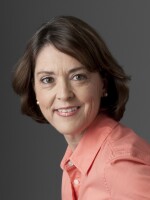First it was the Episcopalians, now it's the Lutherans. The Evangelical Lutheran Church in America — one of the largest Christian churches — is on the brink of sanctioning gay clergy members.
When more than 1,000 members of the clergy and lay people begin a weeklong meeting in Minneapolis on Monday, they will be asked to decide whether to change their policy and allow pastors in gay relationships to serve in the ministry.
What's remarkable is that this once incendiary issue has become humdrum. And humdrum with breathtaking speed, at least for the 4.6 million baptized members of the Evangelical Lutheran Church in America.
Consider the story of Bradley Schmeling, pastor at St. John's Lutheran Church in Atlanta. Early on, he told his bishop that he was gay, but that he was not in a relationship, which was OK by church rules.
"In 2004, I met Darin Easler — at church, just like your mother wants you to do," Schmeling says, laughing. "And our relationship progressed, and it became clear that this was a relationship for life, so I did go tell and the bishop."
The bishop asked Schmeling to resign. Schmeling's church reacted differently.
"They all clapped," he recalls. "And their immediate interests were: What was he like? Where's he from? I had to kind of remind them that there would be consequences for the relationship."
Consequences not just for Schmeling's job, but perhaps for St. John's as well. Soon after, the bishop filed charges against Schmeling in a church court. In February 2007, the jury said that the policy was unfair, but rules are rules, and Schmeling should be removed from the ministry. St. John's kept him on — a risky decision, because if Schmeling remained in the pulpit, the church could be kicked out of the denomination.
Schmeling's trial ignited a debate that had been smoldering for years. At the national assembly a few months after the trial, the Lutherans passed a resolution saying bishops did not have to enforce the rule barring gay ministers if they didn't want to.
No one knows how many bishops look the other way, but people on both sides believe there are at least one or two dozen churches with these "irregular" pastors.
And now, the pro-gay lobby is gaining momentum — less through bomb-throwing than just wearing the conservative opposition down.
"Most of our people are, frankly, tired of the struggle, but we don't want to give up," says the Rev. Paull Spring, who heads Lutheran Coalition for Reform, a group that opposes the ordination of clergy in openly gay relationships.
"There's nothing personal attached to this at all," he adds. "But it is a biblical concern. What does Holy Scripture teach about marriage, what does it teach about family, what does it teach about sexuality? It's very clear: There is no support within Holy Scripture for this kind of relationship."
Those wanting gay ministers disagree: They say Jesus was all about including everyone in his work and mission.
Now that disagreement is being put to the test. And it looks as if the liberals have a good chance of winning.
So conservatives like Spring are already preparing to create a new church within the ELCA, with its own constitution, education system and rules for calling ministers.
"We intend to remain technically within the Evangelical Lutheran Church in America, but practically we will become a de facto synod," he says.
As for Schmeling, he'll attend the assembly as an observer, because he is no longer recognized as a minister. If his side wins, he says he will apply to be readmitted to the church. And he hopes he'll move out of the spotlight as a national symbol.
"I'm kind of looking forward to just slipping back into obscurity and being a regular parish pastor," he laughs.
Of course, the 1,000-plus participants in the assembly can vote any way they want, and they could dash Schmeling's hopes. But even conservatives believe that change is inevitable — if not this year, then at the next assembly in 2011.
Copyright 2022 NPR. To see more, visit https://www.npr.org. 9(MDAzMjM2NDYzMDEyMzc1Njk5NjAxNzY3OQ001))






